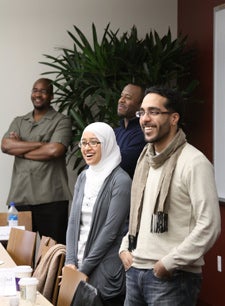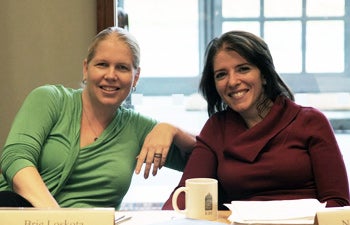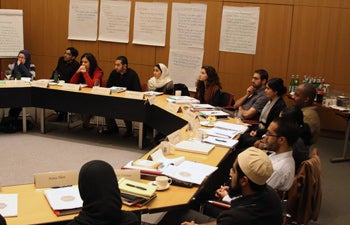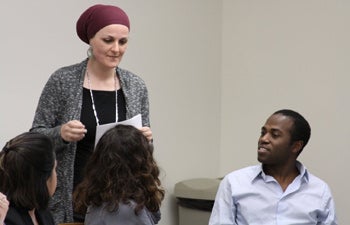A New Generation of Civic Leaders
By day, Salim Patel works as a financial analyst for a large retail clothing company. After hours, he serves as a commissioner on the Board of Education in Passaic, N.J. He also helps run an emergency food pantry, which he co-founded at his mosque, and will soon be launching a full-service social services agency that will include a food pantry, a free clinic and counseling.
You could say he’s got a lot going on.
Patel, 32, points to his faith in Islam, which promotes charity as a central tenet, as a motivation for his work.
“It has inspired me to become involved and change things for the better wherever there may be challenges,” he said.
Patel admits that committing much of his time and effort to his community without professional guidance has been no small task. That’s why he applied for a fellowship with the American Muslim Civic Leadership Institute (AMCLI) at the USC Center for Religion and Civic Culture (CRCC) in USC Dana and David Dornsife College of Letters, Arts and Sciences. He was accepted as a 2010-11 fellow.

2010-11 fellows Mansoor Sabri, Kyle Isma’il, Salim Patel and Asma Men (clockwise from left). Photo by Sumaya Abubaker.
“Sometimes you feel like you’re in your own silo — that no one understands what you’re going through or the struggles that you face on a daily basis,” Patel said. “Personally, I’ve always been a hesitant leader. I went into AMCLI hoping to build a toolbox of skills to help develop my abilities further.”
According to Nadia Roumani, Patel’s story is like one of the many that sparked the creation of the institute.
In her research, Roumani, director and co-founder of AMCLI, found time and again that American-Muslim civic leaders in their 20s and 30s were struggling to maintain their momentum in the wake of September 11.
“Young, emerging leaders were facing a lot of scrutiny and a lot of demands for services, but no one was investing in them to help them become effective leaders,” said Roumani, who also consults for organizations looking to better understand the needs of Muslim communities across the United States.

Brie Loskota (left) and Nadia Roumani co-founded the American Muslim Civic Leadership Institute. Photo by Sumaya Abubaker.
“These leaders were being asked to lead organizations with no mentors and with very little access to resources. They were getting burnt out.”
So, in 2006, Roumani teamed up with Brie Loskota, managing director of CRCC, and Edina Lekovic, communications director of the Muslim Public Affairs Council, to bring together American-Muslim civic leaders ages 25 to 40 from across the country to brainstorm ways to address these challenges.
Out of that session came a set of priorities to help these leaders working in advocacy, social services and beyond. At the top of the list: a leadership development program.
“There’s a fundamental idea that faith communities have a mandate to address social ills,” Loskota explained.
“When faced with challenges like floods, gang violence or homelessness, we know faith communities will be part of the response. We have the idea that they have resources and can act in the public square for the greater good. But the reality is you have to cultivate leaders, train them and give them capacity if you want to be successful.”
In 2008, AMCLI was officially launched with Roumani and Loskota at the helm. The program is housed at CRCC in USC Dornsife, and works in partnership with the Prince Alwaleed bin Talal Center for Muslim-Christian Understanding at Georgetown University.
Fellows meet three times over nine months, with sessions held in New York, Los Angeles and Washington, D.C. Each session features a series of programs that provide practical training in communications, community mobilization, policy analysis and organizational management.

Fellows lead a conversation on leadership based on their reflections on religious scripture and stories. Photo by Sumaya Abubaker.
During a session in January, the 22 fellows from the 2010-11 AMCLI cohort attended a wide variety of seminars at USC’s University Park campus.
Programming included a case study of social movements by Manuel Pastor, professor of American studies and ethnicity; media training with Lekovic; and an examination of how to build partnerships and coalitions with Zach Hoover, executive director of LA Voice, an organization that promotes civic engagement by working with faith communities.
Fellows also had an opportunity to meet with alumni from the previous two cohorts and had a chance to work on their presentation styles with the Ariel Group, a theatre company that works with organizational leaders to hone their interpersonal skills.
“You can work so hard to craft a speech and practice your delivery, but what the Ariel Group gave us was an actual blueprint of how to develop a strong narrative and practice our presentation skills,” Patel said. “I thought it was phenomenal.”
In addition, fellows write case studies on a civic engagement challenge that they’re facing within their own organizations. The case studies help the fellows collectively learn from each other and find solutions to problems. Steven Lamy, professor of international relations and vice dean for academic programs in USC Dornsife, helped develop case-study work.
AMCLI also provides fellows access to resources, one of the most valuable being the peer network developed over the course of the program, according to Asma Men.
“So many of the fellows come from different backgrounds. It’s a great opportunity for me to learn how they do their work and maybe implement it in my own work,” said Men, a 2010–11 AMCLI fellow who is a special projects coordinator at the Orange County Asian and Pacific Islander Community Alliance in California.

Edina Lekovic, an alumna of AMCLI, is director of policy and programming at the Muslim Public Affairs Council. She returned to the program to lead a seminar on media training. Photo by Sumaya Abubaker.
Before AMCLI, most of these leaders had to address problems on their own, Roumani said. “Now they can identify expertise within the group and they can reach out to each other as experts.”
Men said she would like to encourage other American Muslim leaders she knows to take part in the program. “To cultivate future leaders you have to share the wealth of knowledge. It’s been a pot of gold having so many different minds in one room,” she said.
To date, AMCLI has hosted 3 cohorts of fellows — 64 in total — who represent 55 different organizations and hail from 17 states. The fellowship is one of a number of programs at USC that work to build leadership capacity.
“Universities are places where people can have really passionate debates and engagement, but in ways that are constructive and civil,” Loskota explained. “Our role with this work is to take that place where knowledge is exchanged and where people are challenged, and expand that to as many people as possible.”
“In a very politically charged public environment, AMCLI is providing a space where people can come address really hard issues in a place where they don’t feel like they’re under a continual spotlight,” Roumani said.
“They can be intellectually curious and unpack very challenging issues while moving toward a productive outcome.”
AMCLI concluded its 2010-11 program with a final session in Washington, D.C. In addition to attending seminars, fellows connected with their colleagues from previous cohorts at an alumni reunion, and attended a private briefing and reception hosted by the White House Office of Public Engagement.
Patel said he no longer feels isolated in his endeavors. Being able to reach out to the fellows in his AMCLI cohort has been a “lifesaver.”
“The skills I acquired and the overall experience I had cannot be measured,” he said. “I now have 21 lifelines, and then multiply that by the other cohorts. It lets us leverage our respective talents, skills sets and resources in a positive way.”
Applications for the 2011-12 fellowship will become available summer 2011. Sign up to be notified via email when they are available.
To learn more, visit the American Muslim Civic Leadership Institute Web site.